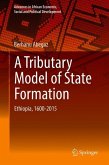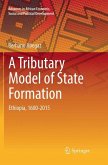This book analyses the historical sociology of state formation in the Horn of Africa. It examines the genesis, trajectories, processes, routes and consequences of the evolution of state formation. Three analytical and explanatory models explain the process of state formation in the HOA: proto-state, colonial and national liberation. The models, heuristically and innovatively, provide understanding, interpretation and analysis of state formation. While the proto-state model explicates an indigenous historical process of state formation, the colonial model refers to an externally designed and imposed process of state formation. The national liberation model concern state formation conducted under liberation movement and ideology. The distinct significance of these models is that collectively they generate sufficient analysis of state formation. They are also unique in that they have never been employed as aggregate analytical and explicative instruments to address the predicament of state formation in the Horn of Africa.
Bitte wählen Sie Ihr Anliegen aus.
Rechnungen
Retourenschein anfordern
Bestellstatus
Storno








